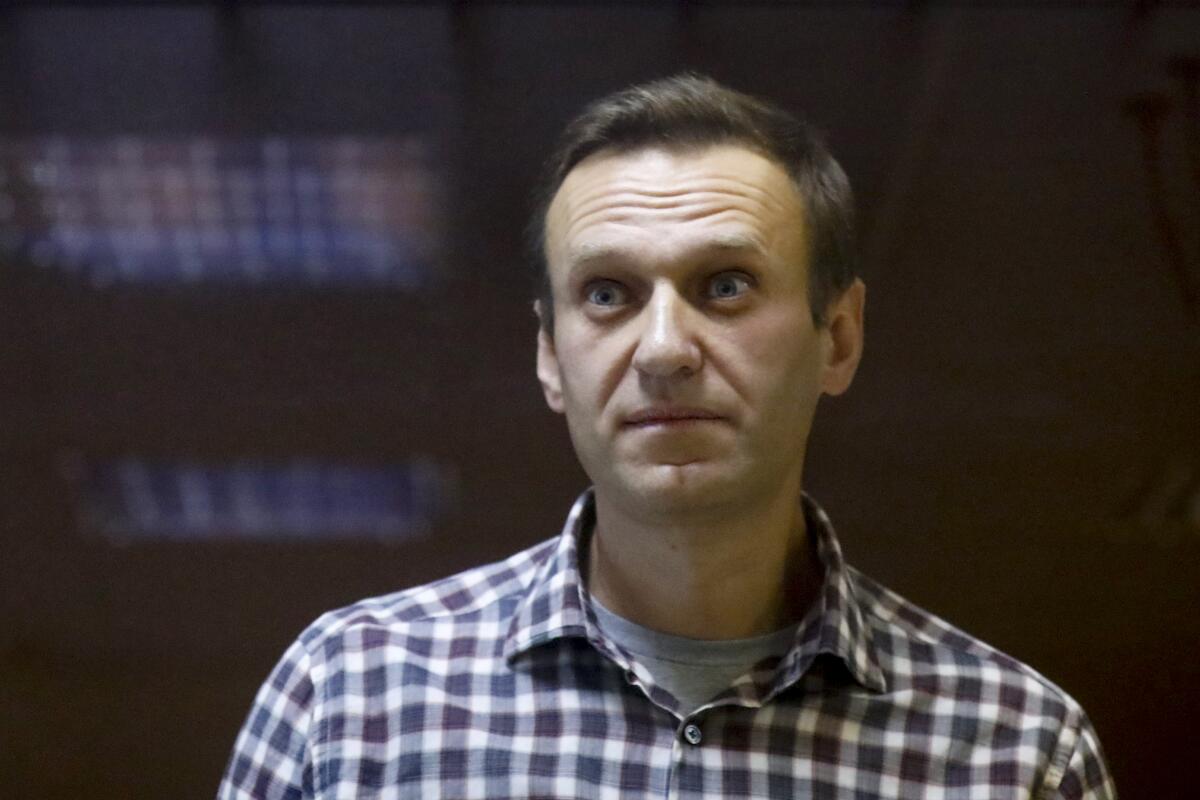Putin opponent Alexei Navalny’s complaint about prison confinement dismissed

- Share via
MOSCOW — Russia’s most prominent opposition leader, Alexei Navalny, lost another court battle Wednesday in his effort to push back against the Kremlin’s widening crackdown on him and other dissenters.
Russian news agencies reported that a court rejected the latest in a series of lawsuits that Navalny has brought against prison authorities regarding his confinement. The 46-year-old politician and activist is serving a nine-year sentence in the maximum security IK-6 prison in the Vladimir region village of Melekhovo, about 155 miles east of Moscow.
Video of a hearing showed Navalny addressing the court remotely from a small room in the prison, standing, gesturing with his hands and speaking in an animated tone to protest authorities’ decision to put him in a punishment cell, in solitary confinement.
“I’m considered the worst offender and I am in solitary confinement because of systematic fabrication of ridiculous violations,” Navalny told the judge in the Vladimir regional city of Kovrov.
Earlier this year, prison authorities sent Navalny to a punishment cell for five days for calling an officer by his name, and again for seven days for walking three seconds in that cell without keeping his hands behind his back, a violation of prison rules. In Wednesday’s hearing, Navalny complained about unfair treatment.
“There are people in cell-type rooms, but there is no one in a punishment cell but me. In fact, any convicted person should be placed in a punishment cell, because there are not more imaginable insignificant violations than one called ‘two seconds [without] hands behind back,’” Navalny said.
Reacting to Wednesday’s decision, a vice president of Navalny’s Anti-Corruption Foundation said it again shows authorities are “trying to break him.” Anna Veduta told the Associated Press from her Washington, D.C., office: “All the actions taken against him are absolutely illegal.”
Navalny was arrested in January 2021 upon returning from Germany, where he had been recuperating from nerve-agent poisoning he blamed on the Kremlin. He received a 2½-year sentence for allegedly violating the conditions of his parole while outside Russia.
In March, Navalny was sentenced to nine years in prison on charges of fraud and contempt of court, allegations he rejected as a politically motivated attempt by Russian authorities to keep him behind bars for as long as possible.
Navalny’s close associates have faced criminal charges and many have left Russia. Russian authorities shut down his group’s political infrastructure — an anticorruption foundation and a nationwide network of offices — by labeling it as an extremist organization.
In another case, Russian oligarch Oleg Deripaska won a lawsuit against Navalny, two associates and publications, Russia’s Tass news agency reported Wednesday. The agency said a Moscow court approved Deripaska’s demand that the accused refute information Deripaska “considers [as] discrediting his honor and dignity.” At issue is a video on Navalny’s YouTube channel called “Yachts, bribes and a mistress.” Navalny’s activism has included exposes of corruption among Russian officials and businesspeople.
Last month, U.S. officials charged Deripaska and three associates with conspiring to violate U.S. sanctions and plotting to ensure his child was born in the United States. The Treasury Department put Deripaska, whose major business is aluminum production and distribution, under economic sanctions in 2018.
More to Read
Sign up for Essential California
The most important California stories and recommendations in your inbox every morning.
You may occasionally receive promotional content from the Los Angeles Times.










